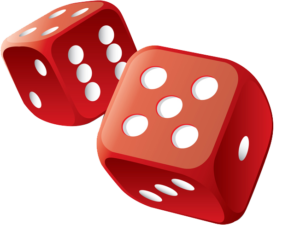Online casinos and land-based casinos are filled with people – players – who are out there trying their luck. Lady Luck is the goddess of gambling and there is no way to persuade her to show you favour. Or is there?
Defining luck is as difficult as catching it. The meaning of luck changes across cultures, languages, religions and countries. What is understood though is that luck leads to good fortune, good fortune leads to happiness and happiness is what we all strive for.
The Oxford English Dictionary definition of luck is: “success or failure apparently brought by chance rather than one’s own actions.” For those chasing luck, and using charms or talismans or superstitions to try and push luck their way, does this mean that they are rather pushing it away if luck happens through no actions from ourselves?
For gamblers, luck is the dice that falls just right, the ball that sticks on the roulette wheel, the pocket aces that are drawn at the poker table.
We certainly believe we can. We blow on the dice, we carry our lucky chip, we only touch our cards with our dominant hand. There are hundreds of different ways we try to influence luck to favour us but, in reality, luck pays no attention to our efforts.

There is a famous story of a British guy who sold everything he owned, bought a ticket to Las Vegas and bet every cent he had on one spin of the roulette wheel – and won! These are the stories that make us believe.
But there are also the stories that go the other way. At the Le Grande Casino in Monte Carlo on August 18, 1913 the roulette wheel landed on black 29 times in a row. Millions were lost as players put their cash on red, certain that it would HAVE to hit after so many blacks. It didn’t – for 29 spins of the wheel. To put the chances of that happening in perspective, David J. Darling calculated that the probability of black coming up 29 times in a row was 1 in 136,823,184.
Both of these stories are examples of luck, one good luck, one bad luck but both luck at the end of the day.
Interestingly enough, there is. Growing consensus among psychologists and scientists about how luck can be ‘manipulated’. Professor Richard Wiseman is a leading figure in the study of luck and human behaviour. He is a Professor of Public Understanding of Psychology at the University of Hertfordshire in England and is described by Scientific American as “…one of the most interesting and innovative experimental psychologists in the world today.” If you want to know why he is considered interesting and innovative, consider that he is a member of the Inner Magic Circle and a frequent collaborator with Derren Brown (the illusionist and mentalist and if you’ve never heard of him do yourself a favour and check him out, especially his ‘Heist’ video where he convinces a group of average people to hold up an armoured car at gunpoint – INSANE!!).
Anyway, back to luck!
According to Professor Wiseman in his research paper “The Luck factor”, good luck is not magic, it’s all about attitude. Lucky people tend to be more open-minded, smile more often and have an easy-going attitude. Those who suffer from anxiety, are tense all the time and feel unhappy a lot seem to attract a more-bad-luck vibe.
Either way, these attitudes affect the decisions both groups make, the opportunities they identify and take, and the luck they get.
Christine Carter, a sociologist, has undertaken studies based on Wiseman’s hypotheses and seems to have come to similar if not the same conclusions:
Luck can be taught, learned and pursued successfully.

Unfortunately, it’s not about lucky objects or superstitious rituals – it’s about how you live your life.
For gamblers this does not mean that you will suddenly start winning every game, it’s more about creating the opportunities to live a lucky and happy life. Which then hopefully translates to smarter more confident gambling.
Keep your eyes and your mind open. Find, try, discover, experiment. People that are too set in their ways will miss opportunities, miss the small signs that life throws their way to take advantage of lucky times.
This is what holds them back from promotions at work, from finding perfect partners or from following their dreams.
Pay attention to the world around you, open yourself to new experiences, embrace life and you’ll open yourself up to attracting luck.
Carter talks about looking for a parking spot in a busy parking lot. If you’re anxious, you close off your peripheral vision, you literally narrow your world view and miss out on opportunities. Where some see luck in finding an open space, lucky people are just open to finding it.
And not only when you’re singing in the shower. Your subconscious is incredibly important at picking up non-obvious clues and signs from the world around you. Some call it intuition, that moment when you’re certain if you pick 26 the roulette wheel will land on it. Listen to the voice inside, train yourself to listen to it. Meditation can help to teach you how to shut out the distractions of the outside world and focus your thoughts on your subconscious.
When you’re open and receptive to the world, the world becomes open to you. Expect good things to happen and you’ll be surprised by how often they do happen. Expect a good run at the casino and you’ll find you have a much better time and you’ll focus more on the winning moments than on the losing ones.
Don’t be set in your ways. Don’t insist on control. Change your habits and routines regularly. Meet new people. Listen to different opinions and music. Try new and unusual tasks and hobbies.
By broadening your experiences, you widen your opportunities – and open yourself to Lady Luck’s embrace!
Do yourself a favour, Google Professor Wiseman and his book ‘The Luck Factor’ and have a read about how to bring luck into your life.
And check out Derren Brown and his mentalist tricks to see how just how our environment and subconscious can affect us.
| Cookie | Duration | Description |
|---|---|---|
| cookielawinfo-checkbox-analytics | 11 months | This cookie is set by GDPR Cookie Consent plugin. The cookie is used to store the user consent for the cookies in the category "Analytics". |
| cookielawinfo-checkbox-functional | 11 months | The cookie is set by GDPR cookie consent to record the user consent for the cookies in the category "Functional". |
| cookielawinfo-checkbox-necessary | 11 months | This cookie is set by GDPR Cookie Consent plugin. The cookies is used to store the user consent for the cookies in the category "Necessary". |
| cookielawinfo-checkbox-others | 11 months | This cookie is set by GDPR Cookie Consent plugin. The cookie is used to store the user consent for the cookies in the category "Other. |
| cookielawinfo-checkbox-performance | 11 months | This cookie is set by GDPR Cookie Consent plugin. The cookie is used to store the user consent for the cookies in the category "Performance". |
| viewed_cookie_policy | 11 months | The cookie is set by the GDPR Cookie Consent plugin and is used to store whether or not user has consented to the use of cookies. It does not store any personal data. |